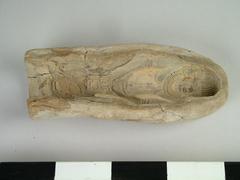Comments and Tags
Be the first to comment on this item!
Decorative Arts
Ceremonial Artifacts ➔ Ushabti Figure
Identifier:
119836Description:
Egyptian, Green faience Ushabti. Black two-tier base is possibly a modern addition.Ancient Egyptians believed life after death was similar to life before death...only better. Crops would grow taller, the sun would always shine, and when one was called up for duty in the field another would generally act as a substitute. This belief is perhaps best exemplified through the shabti figures that were placed in tombs to magically perform laborious tasks for their owner in the afterlife.
The appearance of shabtis changed through time. Whenshabtis were first made around 2100 B.C.E., a singleshabti was all that a tomb required. By the time of the Tutankhamun in 1300 B.C.E., wealthy Egyptians had at least 365 shabtis -one for each day of the year. To keep these unruly laborers in line, each group of ten shabtishad its own whip-toting supervisor!
